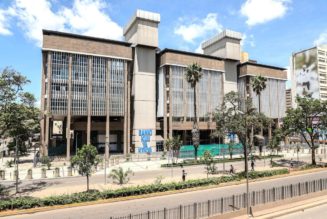Economy
State House overshoots six month budget by Sh447m
Thursday February 22 2024

President William Ruto, his Deputy Rigathi Gachagua, Interior CS Kithure Kindiki and his Mining counterpart Salim Mvurya arrive at Lake Naivasha Resort for day three of the National Executive retreat on February 21, 2024. PHOTO | BONIFACE MWANGI | NMG
State House overshot its budget for the half year to December by Sh447 million, official numbers show, dealing a blow to austerity measures announced by the Ruto administration.
Expenditures at President William Ruto’s official residence amounted to nearly Sh5.37 billion in the six months against a target of Sh4.92 billion, according to the Treasury’s budgetary review report.
Recurrent bills such as maintenance, administration, and compensation for employees accounted for the bulk (92.39 percent) of the overspending.
The spending on running the State House stood at Sh4.68 billion between July and December last year, racing past Sh4.26 billion which had been set for the period. Cash spent on development programmes exceeded budget by 5.19 percent to Sh689 million, the data indicate.
Read: State House hit as Sh47bn spending requests rejected
“In order to maintain the primary balance consistent with the fiscal consolidation path, expenditures have to be maintained at the levels approved in printed estimates,” the Treasury officials wrote in the Budget Review and Outlook Paper for the current fiscal year.
“In this respect, additional spending pressures will be accommodated within the approved ceilings, that is reallocation possibilities, except those of the security and education sectors.”
The Treasury does not normally give reasons for the budget outcome for specific ministries, departments, and agencies. This came on the back of the State House getting an additional Sh2.53 billion in the supplementary budget late last year “to cater for personnel emolument, enhanced operations & maintenance expenses, refurbishment of buildings and other civil works”.
The additional funding took the full-year budget for State House affairs to Sh9.84 billion.
The budget for the State House is separate from the Executive Office of the President. which caters to operations at Harambee House where Dr Ruto’s official office is situated.
Expenditure at Dr Ruto’s Harambee House office amounted to Sh1.75 billion, underperforming the target by Sh270 million.
The Treasury data reveals further over-expenditure in the security sector. The State Department of Internal Security exceeded the budget by Sh3.84 billion in the review period to Sh22.34 billion, while the National Police Service spent Sh1.27 billion more than budgeted for to Sh55.25 billion.
The Immigration and Citizen Services department surpassed the budget by the largest margin of 23.10 percent, or Sh1.46 billion, to stand at nearly Sh7.78 billion.
The National Police Service was forced to battle opposition-led anti-government protests over the deepening cost of living crisis at the beginning of the financial year, while the Immigration undertook operational and policy changes to clear a passport applications backlog.
The Treasury had last September linked the over-expenditure to “MDAs [ministries, departments, and agencies] committing beyond their budgets”.
Kenya’s fiscal austerities are largely hinged on the increased taxation, including doubling of value added tax on fuel to 16 percent and a 1.5 percent housing levy on monthly pay for workers which has been declared unconstitutional by the courts.
This was corroborated by Central Bank of Kenya Governor Kamau Thugge who warned last year that Kenya had run out of room for spending cuts.
Read: State House upgrade to cost taxpayers Sh795m by June
The austerities target reducing the size of the hole in the budget – which is filled through borrowing – from 5.6 percent of gross domestic product last financial year to 4.4 percent in the current one ending June and 3.9 percent in the one that follows.
“The government will continue to rationalise expenditures by eliminating non-core expenditures while improving efficiency in development projects implementation so as to contain expenditure growth, stabilise debt and reduce debt vulnerabilities,” the Treasury wrote in the 2024 Budget Policy Statement.









